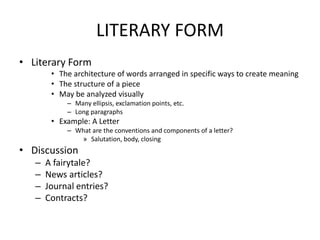
Introduction to Literature and Composition
- 1. LITERARY FORM • Literary Form • The architecture of words arranged in specific ways to create meaning • The structure of a piece • May be analyzed visually – Many ellipsis, exclamation points, etc. – Long paragraphs • Example: A Letter – What are the conventions and components of a letter? » Salutation, body, closing • Discussion – A fairytale? – News articles? – Journal entries? – Contracts?
- 2. LITERARY CONTENT • What is a genre? – Poetry – Fiction – Essay – Parable • Setting – Environment – Time period • Protagonist • Antagonist • Problem – Plot – Events – Man vs Nature – Man vs Man – Man vs Self • Imagery • Metaphor
- 3. CRITICAL READING • Reading critically is a process of constantly judging between form and content • In literature, because it is creative, there is a great deal of uncertainty • Critically analyzing literature requires a thorough analysis of form and content in order to understand the FULL meaning of a piece
- 4. Pre-Reading • Jot down notes • Personal expectations – have you ever heard of the author? • What does the title say to you? • What is the genre?
- 5. Reading • What doesn’t make sense? Take note of words or ideas you don’t understand • What is unexpected and striking? • Recognize and analyze patterns, repeated words, or obvious themes. • What is your reaction to the piece?
- 6. Critical Analysis • Look up everything which had puzzled you like the words you didn’t know etc. • Process your pre-reading expectations to your post-reading conclusions. • Re-read • Go through the images and metaphors one at a time and determine what they may mean • What is the emotional intent? • What is the analysis?
- 7. Sylvia Plath’s Metaphors I'm a riddle in nine syllables, An elephant, a ponderous house, A melon strolling on two tendrils. O red fruit, ivory, fine timbers! This loaf's big with its yeasty rising. Money's new-minted in this fat purse. I'm a means, a stage, a cow in calf. I've eaten a bag of green apples, Boarded the train there's no getting off. CRITICAL READING QUESTIONS • Make a chart of the images • Plath believed she was pregnant when she wrote this poem • What is her attitude towards the pregnancy? • What associations are negative? Are positive? Are ambivalent? • How do her chose images interact with each other? • What is the conclusion?
- 8. “I Hate Trees” • Read Rosa Ehrenreich Brooks - Page 33 "I Hate Trees” essay. • Summarize Brooks' essay and then analyze your summary. • What was most difficult about writing the summary? • What is the difference between summarizing an essay and a creative piece like fiction or poetry?